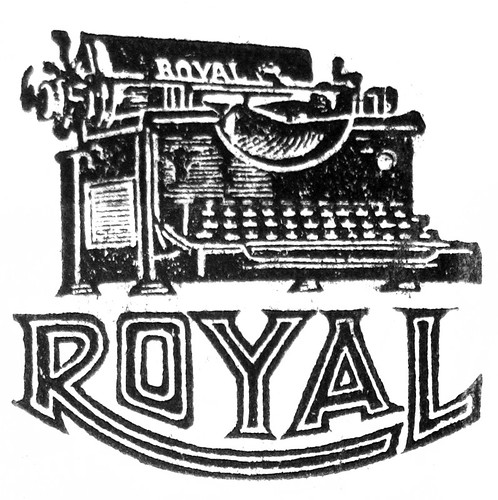
- ztyper
- Key Master
 Offline
Offline 
- From: Somewhere in New Jersey
- Registered: 01-10-2014
- Posts: 773
Lifetime of a typewriter?
This is a question for those who can remember, but what, on average, is the lifetime of a typewriter? Or really, the full-time working career of a typewriter? This is more for standards than portables because portables tend to be used longer (at least in my personal experience). It's hard to pin down because my Royal 10 came with the special rubber keytops that were used in the 40's or 50's. But was it used much after that? And what about blind-writers? Did they go out of style once the Underwood hit the market? And when did using a manual typewriter become a sign of antiquity?
A high schooler with a lot of typewriters. That's pretty much about it.
- KatLondon
- Key Master
 Offline
Offline 
- From: London
- Registered: 11-10-2014
- Posts: 995
Re: Lifetime of a typewriter?
I think the answer is different for different people and in different places. I have older friends, writers, who still write on typewriters. Office machines went out when comuters got easier to do the work with. In the case of bureaucratic forms etc, you used to receive a letter with a big form in it, fill it out by hand and mail it back to them. The bookshop I was working in computerised its systems in 1989. My grandmother typed all her letters and cards because her handwriting got shaky in old age, and she died in 1993.
I had my first computer in the mid-90s, but I was one of the last in my family to get one. The internet was kind of getting going, but it didn;t REALLY take off, bigtime, till around 2000 with Web 2.0 - and I think that was the point where trying to ignore computers just became, in every aspect of life, impossible.
But certainly by the mid-to-late 1970s, manuals were considered old hat and 'clunky', and the very first \typewriters with memory' were being called 'word processors', and there were articles about real writers who actually used them to write with. !! I remember withering scorn. And when I first went to write a novel, on a computer, in abput 1995, I printed my drafts out and literally cut and taped the paragraphs into the order I wanted, abefore moving it all around on the screen. It never occurred to me to do it another way, and THAT is what I now want to get back to.
So the answer is: there was no one moment. It was a creep, which is why no one really remembers. Interesting question and I wonder what other people's experience is.
- Repartee
- Key Master
 Offline
Offline 
- From: Brooklyn
- Registered: 12-10-2015
- Posts: 683
Re: Lifetime of a typewriter?
KatLondon wrote:
I printed my drafts out and literally cut and taped the paragraphs into the order I wanted, abefore moving it all around on the screen.
I remember "inventing" physical cut-and-paste to write a term paper, and very proud I was of myself at finding such a nefarious way of cheating. Must have been early '70's. I typed the paper stream of consciousness, whatever popped into my head, snipped it up and put it back together in some logical order by taping it to fresh sheets of paper, then retyped the result. Interesting questions that come to mind now are (1) why did I consider that this was cheating(!) and (2) why don't I call it "cut and tape"? The origin of the phrase must be old... prior to ubiquitous clear tape... and maybe even predates typing. You could do the same to a written manuscript.
KatLondon wrote:
It never occurred to me to do it another way, and THAT is what I now want to get back to.
Interestingly though this technique allowed me to throw together a paper in record time - so that clearly I invented it under force of necessity - I never reused it until I began doing it on computers. Since my personal writing does not rise beyond persiflage (sorry, Persiflage), I mainly just edit paragraphs, but I have used the full blown technique at work for longer documents. Off-topic for typing, but at least the first anecdote involved a typewriter.
OB METAHISTORICAL COMMENT: technology never evolves monotonically toward advantage, but when a new technique becomes dominant by general practical superiority some things the old technology did better will at least be temporarily lost. I am thinking that cutting up paragraphs and turning them into physically movable objects must activate some circuitry in our manually focused brains not tapped by doing something similar on a screen, and achieve different results.
"Damn the torpedoes! Four bells, Captain Drayton".
- TypewriterGuy
- Typewriter Talk Vet
 Offline
Offline 
- From: United States
- Registered: 24-4-2015
- Posts: 1,250
Re: Lifetime of a typewriter?
I think I remember from reading it was about 5 yearsfor offices. But then of course, someplaces would use older machines too.
Back from a long break.
Starting fresh with my favorite typer. A Royal Futura!
- KatLondon
- Key Master
 Offline
Offline 
- From: London
- Registered: 11-10-2014
- Posts: 995
Re: Lifetime of a typewriter?
It's like what's the average lifetime of a car. Some people get a new one every few years, others drive old bangers, and look at Cuba - through self-repair they've managed to keep their 1950s cars going for half a century. My other half is currently driving 1991 Mercedes...
- ztyper
- Key Master
 Offline
Offline 
- From: Somewhere in New Jersey
- Registered: 01-10-2014
- Posts: 773
Re: Lifetime of a typewriter?
Well I suppose I ask this because I want to know how well my typewriters were worked. In my eyes, the more it was used, the better its life. It's why I am upset when I see a typewriter barely used on Craigslist going for very little; it's almost as if it was never loved. But I just wanted to see what other people's experience was.
Thanks for the insight though. ![]()
A high schooler with a lot of typewriters. That's pretty much about it.
- •
- treefaller
- Touch Typist
 Offline
Offline 
- From: The Dalles, Oregon, USA
- Registered: 24-9-2015
- Posts: 153
Re: Lifetime of a typewriter?
Hey, thanks Repartee. I learned a new word today: persiflage (not sure why you wanted it capitalized) And here all along I've been calling my writing "garbage". This gives it a much fancier flavor, yes indeed!
Bangin' around, this dirty old town, typin' for nickels and dimes...
- KatLondon
- Key Master
 Offline
Offline 
- From: London
- Registered: 11-10-2014
- Posts: 995
Re: Lifetime of a typewriter?
Ztyper, it's like collecting anything old. Original Star Wars figurines in their original cellophane... perhaps unsurprisingly, my ex-husband is an antiquarian bookdealer (& my partner is a photographer who shoots on film); there's nothing quite as poignant as a 150-year-old book (from the days when you used a letter-opener to cut open the edges of the pages) with uncut pages...
- Repartee
- Key Master
 Offline
Offline 
- From: Brooklyn
- Registered: 12-10-2015
- Posts: 683
Re: Lifetime of a typewriter?
KatLondon wrote:
It's like what's the average lifetime of a car. Some people get a new one every few years, others drive old bangers.
Or cell phones. The planned obsolescence point seems to be about two years, between two and three you are seriously thinking about getting a new phone even if you are not the have-to-have-the-latest type, but some people keep them far longer.
KatLondon wrote:
and look at Cuba - through self-repair they've managed to keep their 1950s cars going for half a century.
More common in ships and planes. 30-35 years is the expected lifetime of a naval vessel, and B-52's have been older than the pilots that fly them for so long that it no longer even seems like a clever thing to say. And yet they are still flying. "Planned obsolescence" no longer seems like a cutting edge observation either, and yet it remains a fact of business. But cherishing and continuing to use 85 year old working typewriters strikes a blow for maintenance!
"Damn the torpedoes! Four bells, Captain Drayton".
- Repartee
- Key Master
 Offline
Offline 
- From: Brooklyn
- Registered: 12-10-2015
- Posts: 683
Re: Lifetime of a typewriter?
treefaller wrote:
Hey, thanks Repartee. I learned a new word today: persiflage (not sure why you wanted it capitalized) And here all along I've been calling my writing "garbage". This gives it a much fancier flavor, yes indeed!
Bwhahahaha....! Perhaps since you are giving up the term, treefaller, I will instead call my writing "garbage". I am a simple man.![]()
As for capitalization, that was actually a remark to the user known as "Persiflage", to whom I must give credit for reviving this word in my working vocabulary, and whose train of thought I shamelessly side-tracked in picking my own. ![]()
"Damn the torpedoes! Four bells, Captain Drayton".

 1
1 